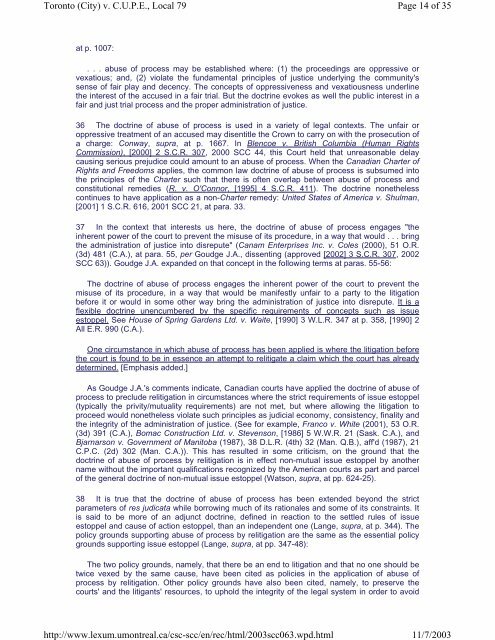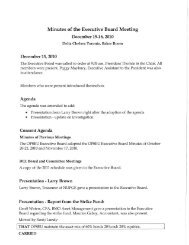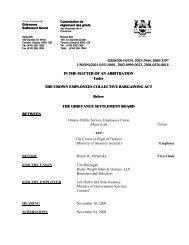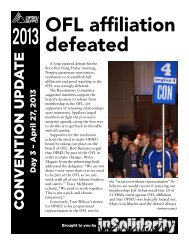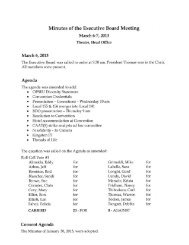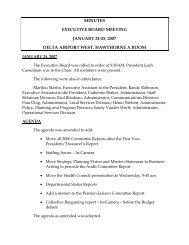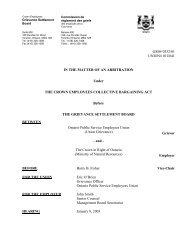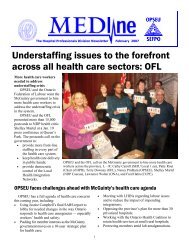C.U.P.E., Local 79 v. Toronto (City) .pdf - OPSEU
C.U.P.E., Local 79 v. Toronto (City) .pdf - OPSEU
C.U.P.E., Local 79 v. Toronto (City) .pdf - OPSEU
You also want an ePaper? Increase the reach of your titles
YUMPU automatically turns print PDFs into web optimized ePapers that Google loves.
<strong>Toronto</strong> (<strong>City</strong>) v. C.U.P.E., <strong>Local</strong> <strong>79</strong><br />
http://www.lexum.umontreal.ca/csc-scc/en/rec/html/2003scc063.wpd.html<br />
Page 14 of 35<br />
11/7/2003<br />
at p. 1007:<br />
. . . abuse of process may be established where: (1) the proceedings are oppressive or<br />
vexatious; and, (2) violate the fundamental principles of justice underlying the community's<br />
sense of fair play and decency. The concepts of oppressiveness and vexatiousness underline<br />
the interest of the accused in a fair trial. But the doctrine evokes as well the public interest in a<br />
fair and just trial process and the proper administration of justice.<br />
36 The doctrine of abuse of process is used in a variety of legal contexts. The unfair or<br />
oppressive treatment of an accused may disentitle the Crown to carry on with the prosecution of<br />
a charge: Conway, supra, at p. 1667. In Blencoe v. British Columbia (Human Rights<br />
Commission), [2000] 2 S.C.R. 307, 2000 SCC 44, this Court held that unreasonable delay<br />
causing serious prejudice could amount to an abuse of process. When the Canadian Charter of<br />
Rights and Freedoms applies, the common law doctrine of abuse of process is subsumed into<br />
the principles of the Charter such that there is often overlap between abuse of process and<br />
constitutional remedies (R. v. O'Connor, [1995] 4 S.C.R. 411). The doctrine nonetheless<br />
continues to have application as a non-Charter remedy: United States of America v. Shulman,<br />
[2001] 1 S.C.R. 616, 2001 SCC 21, at para. 33.<br />
37 In the context that interests us here, the doctrine of abuse of process engages "the<br />
inherent power of the court to prevent the misuse of its procedure, in a way that would . . . bring<br />
the administration of justice into disrepute" (Canam Enterprises Inc. v. Coles (2000), 51 O.R.<br />
(3d) 481 (C.A.), at para. 55, per Goudge J.A., dissenting (approved [2002] 3 S.C.R. 307, 2002<br />
SCC 63)). Goudge J.A. expanded on that concept in the following terms at paras. 55-56:<br />
The doctrine of abuse of process engages the inherent power of the court to prevent the<br />
misuse of its procedure, in a way that would be manifestly unfair to a party to the litigation<br />
before it or would in some other way bring the administration of justice into disrepute. It is a<br />
flexible doctrine unencumbered by the specific requirements of concepts such as issue<br />
estoppel. See House of Spring Gardens Ltd. v. Waite, [1990] 3 W.L.R. 347 at p. 358, [1990] 2<br />
All E.R. 990 (C.A.).<br />
One circumstance in which abuse of process has been applied is where the litigation before<br />
the court is found to be in essence an attempt to relitigate a claim which the court has already<br />
determined. [Emphasis added.]<br />
As Goudge J.A.'s comments indicate, Canadian courts have applied the doctrine of abuse of<br />
process to preclude relitigation in circumstances where the strict requirements of issue estoppel<br />
(typically the privity/mutuality requirements) are not met, but where allowing the litigation to<br />
proceed would nonetheless violate such principles as judicial economy, consistency, finality and<br />
the integrity of the administration of justice. (See for example, Franco v. White (2001), 53 O.R.<br />
(3d) 391 (C.A.), Bomac Construction Ltd. v. Stevenson, [1986] 5 W.W.R. 21 (Sask. C.A.), and<br />
Bjarnarson v. Government of Manitoba (1987), 38 D.L.R. (4th) 32 (Man. Q.B.), aff'd (1987), 21<br />
C.P.C. (2d) 302 (Man. C.A.)). This has resulted in some criticism, on the ground that the<br />
doctrine of abuse of process by relitigation is in effect non-mutual issue estoppel by another<br />
name without the important qualifications recognized by the American courts as part and parcel<br />
of the general doctrine of non-mutual issue estoppel (Watson, supra, at pp. 624-25).<br />
38 It is true that the doctrine of abuse of process has been extended beyond the strict<br />
parameters of res judicata while borrowing much of its rationales and some of its constraints. It<br />
is said to be more of an adjunct doctrine, defined in reaction to the settled rules of issue<br />
estoppel and cause of action estoppel, than an independent one (Lange, supra, at p. 344). The<br />
policy grounds supporting abuse of process by relitigation are the same as the essential policy<br />
grounds supporting issue estoppel (Lange, supra, at pp. 347-48):<br />
The two policy grounds, namely, that there be an end to litigation and that no one should be<br />
twice vexed by the same cause, have been cited as policies in the application of abuse of<br />
process by relitigation. Other policy grounds have also been cited, namely, to preserve the<br />
courts' and the litigants' resources, to uphold the integrity of the legal system in order to avoid


